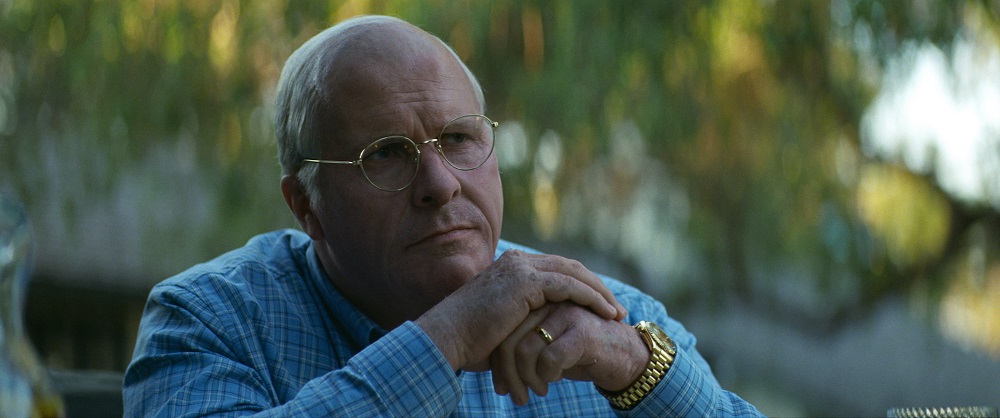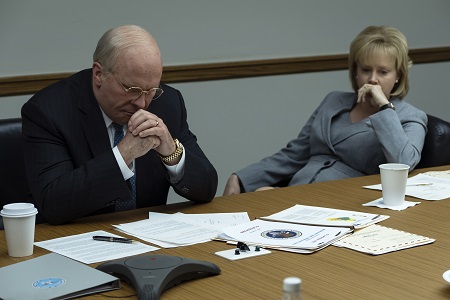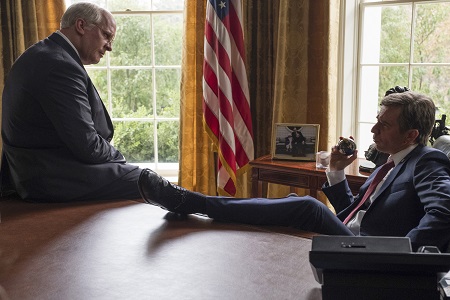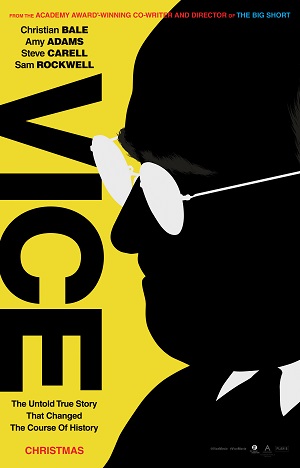
Well Cast Vice a Condescending and Obvious Political Satire
Adam McKay opened my eyes somewhat with his 2015 Oscar-winner The Big Short. Up until that point I can’t say I was a huge fan, his series of popular comedies with Will Ferrell, a list which includes Anchorman: The Legend of Ron Burgundy, Step Brothers and The Other Guys, not doing much for me. While all of them have been technically proficient and made with noticeable skill, I just didn’t really find them all that consistently funny, and as such the director wasn’t high on my list of filmmakers I felt like keeping an eye on.
McKay’s star-studded satirical exploration of the late 2000’s housing crisis made me reconsider that opinion. The film was made with inventive skill, the way he and co-writer Charles Randolph adapted Michael Lewis’ best-selling book for the screen overflowing in creative imagination. The way the director opened up the motion picture to break the fourth wall to talk directly to the audience in order to explain in short, punchy bursts of adrenaline the ins and outs of the more minute concepts of the housing crisis were extraordinary. I loved much of what McKay did with The Big Short, and in the couple years since its original release I’ve found his massively amusing satire has only grown in resonance and entertainment value with each passing day.
I do not foresee the same thing happening with his latest attempt at historical deconstruction Vice. Even with a magnificent central performance from an almost unrecognizable Christian Bale as Dick Cheney and a superb supporting cast which includes the likes of Amy Adams as Lynne Cheney, Sam Rockwell as George W. Bush, Steve Carell as Donald Rumsfeld, Alison Pill as Mary Cheney, LisaGay Hamilton as Condoleezza Rice, Lily Rabe and Liz Cheney and Tyler Perry as Colin Powell this movie frustrated and annoyed me more than it did anything else. McKay’s utilization of the same fourth wall-breaking style he used for The Big Short feels decidedly unnecessary, while his historical observations regarding the controversial political figure aren’t especially deep or insightful. I found the director’s latest to be nothing more than a constant frustration, and as great as a few individual moments and scenes might be, and as strong as pretty much all of the performances are, for me this easily ranks as one of 2018’s most surprising disappointments.
As narrated by Jesse Plemons, portraying a character who initially appears to be a generic, politically-astute everyman but in reality ends up being so much more, the film is an overview of Dick Cheney’s ascension to the office of Vice President under President George W. Bush and how he changed perceptions of that position in the U.S. Government forever. It also covers his marriage to Lynne, initial support for daughter Mary when she comes out as a lesbian and his Congressional internship where he becomes the right-hand man to Donald Rumsfeld. His time as Haliburton CEO is touched upon, as are other various highlights from his and Lynne’s life together weathering every hardship and scandal that came their way.
That’s pretty much it, the movie an observational comedy-drama hybrid analyzing Dick Cheney and the various things he accomplished in his life from a conversationally bird’s eye view. It doesn’t want to scrutinize, doesn’t want to dig too deep, McKay adding an occasional jolt of haughty laughter from either one of the characters watching things play out or from Plemons’ (mostly) unseen narrator. Instead Vice just seems content to make supercilious fun of everything, its most pointed barbs not so much directed at Dick Cheney and his enablers so much as they are at the audience itself. When the fourth wall is broken and Plemons starts explaining what is going on it’s almost as if he’s berating the viewer personally for allowing Bush, Cheney and all of their cronies to come to power in the first place. To me this felt more than a little condescending, and while McKay isn’t pulling his punches they still came across as nothing more than cheap shots pummeling the wrong adversary.
Don’t blame the cast. McKay gives his actors plenty of room to make these real life figures their own, Rockwell, Perry, Carell and especially Adams all exemplary. But it is Bale who steals the show. He’s magnificent as Dick Cheney, and instead of relying upon the impressive prosthetic makeup effects to do the heavy lifting for him the Oscar-winning actor still manages to give a delicately refined, aggressively complex performance that’s frequently extraordinary. While getting inside this man’s headspace is frequently a distasteful place to be Bale doesn’t attempt to modulate what he’s doing in some clueless attempt to make the man likable or empathetic. Instead, he’s digging deeper than that, trying to find the internal mechanisms that make Dick Cheney tick, and in doing so paints a far more fascinating portrait of the man than I initially assumed possible.
As great as he and the rest of his castmates are, however, none of that is enough for me to find the overall film even moderately worthwhile. It doesn’t say anything new, doesn’t offer any incredible insights that forced me to look at Dick Cheney, if not in a different way, at least from an angle I might not have thought to view him from beforehand. But McKay doesn’t seem interested in doing that. Instead, as I’ve already stated he just seems to want to poke fun at all this disturbing absurdity in ways that to my mind were both obvious and patronizing. After The Big Short I expected more from the director. To say Vice didn’t deliver on those expectations would be to understate that sentiment considerably.
– Review reprinted courtesy of the SGN in Seattle
Film Rating: 2 (out of 4)








